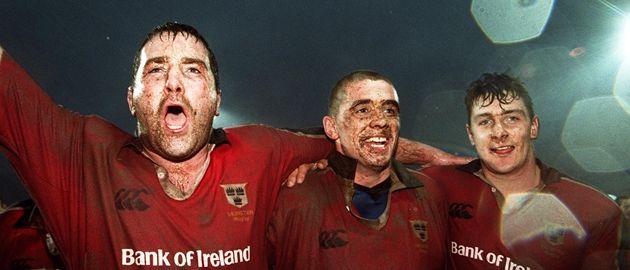

Share
16th October 2016
04:32pm BST

"Pride," he answered. "It’s pride in place, pride in parish, pride in your friends. "It is understanding who you represent. It’s not just yourself, it is the people connected to you going back to your underage coach, the school you came out of, the parish you came out of. "A lot of people are connected toward you and it is how you hold yourself to that. That’s the best you can do."He was soft spoken at times but, boy, when he spoke, he spoke. That was August 2014. Foley was head coach of Munster Rugby and he had assembled a coaching team with friends and former teammates such as Jerry Flannery and Mick O'Driscoll. He was excited for the season, and challenges ahead. He was even looking forward to the sleepless nights.
"I do dream about Munster," he admitted. "It’s a 24/7 job now. It never leaves your head, even when you’re at home, no matter what you’re doing. Do you get any rest when you shut your eyes? Probably not."His dreams were Munster because Munster was a huge part of him. Munster, family , friends, parish. The order often changed but those were the pillars.

"For me, it was around physical development. When you’re a big lad coming through, you really didn’t need, in the amateur game at the time, much time in the gym. Your physical presence would get you through games. "But then, a couple of years into the professional game, you were the same size but you were relying on skill and durability. You needed to adjust to that and make sure you were able to play through seasons. I got into that. "There were a few stumbling blocks along the way but I got over that and never looked back. I feel it was important that I got to see both sides of the game."One of the big stumbling blocks was his fitness, or perceived lack thereof, for the international game. He missed out on three years with the Irish team when he really should not have. From February 1997 to February 2000, Foley was out in the cold. “You talked to yourself; you figured it out,” he once said of his renewed drive.
"There were a lot of good role models around [Shannon and Munster] at the time. Around that period when I was struggling to adjust, Shannon won four AILs on the bounce and Munster had won a few interprovincials. "You might wonder how you were struggling but you were because you wanted to be the best at the highest possible level. It all depends what standards you were holding yourself to. Mine would have been international standard."Once he got another chance with Ireland, he did not look back. He was the No.8 we all came to count on. If a game was on the line and a big play was needed - in attack or defence - you did not have to look far. Foley would wade right in. He played 53 times over the next five years [taking his Test total to 62] and scored five tries. He was part of that Ireland team that started to collect Triple Crowns and set the stage for Grand Slam glory.
 He retired from Munster in 2008 having represented the province 202 times [amateur and professional] captained them to the 2006 Heineken Cup and helped them to another in 2008.
Having acted as forwards coach at his province for four seasons - during which he was seconded to Declan Kidney's Ireland team - Foley was named head coach in 2014. He led Munster to a Guinness PRO12 final in his first season at the helm but they under-performed in 2015/16 and Rassie Erasmus was installed as his superior in a new Director of Rugby role.
At the PRO12 launch, two months ago, Erasmus told me how much Foley was enjoying the day-to-day coaching that he had little time to do as head coach.
That was what Foley the coach loved best. Preparing the man; preparing for battle.
He retired from Munster in 2008 having represented the province 202 times [amateur and professional] captained them to the 2006 Heineken Cup and helped them to another in 2008.
Having acted as forwards coach at his province for four seasons - during which he was seconded to Declan Kidney's Ireland team - Foley was named head coach in 2014. He led Munster to a Guinness PRO12 final in his first season at the helm but they under-performed in 2015/16 and Rassie Erasmus was installed as his superior in a new Director of Rugby role.
At the PRO12 launch, two months ago, Erasmus told me how much Foley was enjoying the day-to-day coaching that he had little time to do as head coach.
That was what Foley the coach loved best. Preparing the man; preparing for battle.

Explore more on these topics: